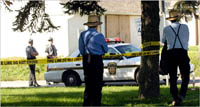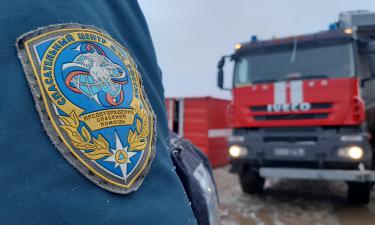Bush administration hopes idea-sharing will quell school violence
Compelled to respond to a spike in U.S. school violence, the Bush administration is hoping that a high-profile summit will get the word out about safety.

President George W. Bush called for Tuesday's conference after three shooting rampages in two weeks unnerved the United States. Communities in Colorado, Wisconsin and Pennsylvania are still grieving.
Bush is expected to offer sympathy at the event and to encourage people to ask questions at home about whether their schools are prepared for emergencies.
Four weeks before the midterm elections, the event allows Bush to return to the politically safe issue of education and child safety. But the federal role in making schools safer is limited because education remains mainly a local matter. The White House chose to host a national sharing of ideas, hoping to seize a moment when people are focused on preventing violence.
Two Cabinet members, Education Secretary Margaret Spellings and Attorney General Alberto Gonzales, will lead panel discussions. First lady Laura Bush is also scheduled to speak.
No new policies are expected; strategies for keeping schools safe are widely known. But experts say schools often don't get serious about safety until shootings make headlines.
On Monday, a 13-year-old student in Joplin, Missouri, carried an AK-47 into his middle school and fired a shot into a ceiling. He left the building and was apprehended by police.
Preventing violence, and coping with tragedy, are the topics of the panel discussions.
Among the speakers will be Craig Scott, who survived the massacre at Columbine High School in Colorado in 1999. Student gunmen killed his sister and 12 others.
Another panelist is Park County Sheriff Fred Wegener. He responded in Bailey, Colorado, on Sept. 27, when a man held several girls hostage in a school before killing one and himself.
Other speakers include educators, school administrators and crime prevention experts.
About 300 people are expected at the National 4-H Conference Center in Chevy Chase, Maryland.
"Bringing people together to talk about what's working that can't hurt," said William Lassiter, manager of the Center for the Prevention of School Violence in Raleigh, North Carolina.
"I think schools have gotten back into a comfort zone again," Lassiter said. "I'm not saying we should put barbed wire up around schools or take other drastic measures. What we really need to look at is basic safety steps you would take at your own house."
Lassiter also questioned the Bush's administration attempt to cut US$347 million (Ђ275.3 million) in school-safety grants for states this year. Bush's budget says the program is ineffective, reports AP.
The White House says that beyond those state grants, the government spends larger amounts on successful school safety programs through its education, justice and health agencies.
Meanwhile, there is no pattern to deadly shootings at schools.
Subscribe to Pravda.Ru Telegram channel, Facebook, RSS!





